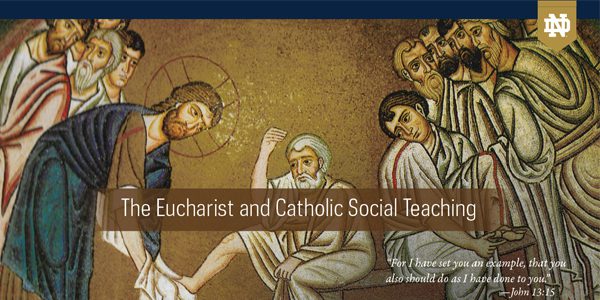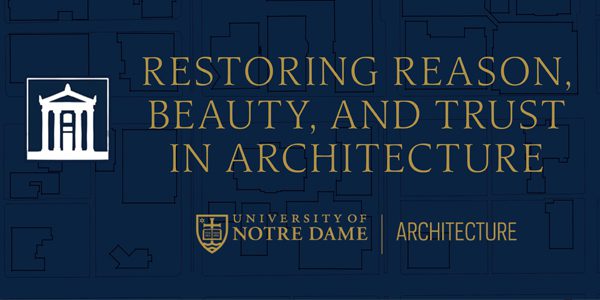Thinking with Newman: Educating with Intention Today – Contemporary Relevance of “The Idea of a University”
Subscribe to the ThinkND podcast on Apple, Spotify, or Google.
Featured Speakers:
- Rev. Gary Chamberland, C.S.C., Director of the Notre Dame Newman Centre for Faith and Reason
- Kevin Whelan, Michael Smurfit Director of the Notre Dame Dublin Global Gateway
- Rev. Gerard J. Olinger, C.S.C., Vice President for Mission Engagement and Church Affairs at the University of Notre Dame
The first event in the Thinking with Newman series focused on John Henry Newman’s discourse on education and how it plays a role in today’s university. For this series, Rev. Gary Chamberland, C.S.C., and Kevin Whelan, acted as our hosts with special guests, Most Rev. Diarmuid Martin, Mary Katherine Tillman, and Adam Kronk.
The first question posed in the event was directed to Tillman. She was asked to list a few key points that Newman made about education. She answered by saying Newman believed knowledge is precious, that it helps form the whole self, and that the unity of knowledge formed his philosophy. Unity of knowledge is especially present in liberal art education, where various subjects combine to form the whole mind. Tillman’s introduction to Newman’s views on education advanced the conversation towards topics related to the challenges of education in modern society. Archbishop Martin thought that one challenge of education is that there is not enough emphasis on inquiry. Knowledge is not just facts, he said, but there is an element of wonder that is sometimes lacking in modern education.
As an educator, Kronk believes that educating young people with Newman’s values and philosophy is an uphill battle, especially time and attention have been commoditized by social media, television, and other distractions. Kronk’s educational approach is to cultivate attention and focus, as well as connection with others in the classroom. When the environment is noisy, this practice takes a lot of reminders and intention both from the educators and students.
Fr. Chamberland and Whelan closed the event by focusing on how education should be more than just trying to get into a good college or have a high paying job. Fr. Chamberland asked if the purpose of education is expanding the intellect, then how do you argue that Catholic education is more than training for an occupation? Tillman responded that Newman would argue that education should not be burdened by religion. The byproduct of a good education is becoming a good person. Kronk said that a full perspective on education is not just about getting accepted into an Ivy League school. A solid Catholic education is not just a means to an end, but it can be its own end.
In closing, the experts claimed that education is more than simply memorizing facts and getting a good job. Education is learning to expand the mind. It can be a long process. It does not happen quickly and easily, but slowly and faithfully, in God’s time.
Key Takeaways and Time Stamps
- Knowledge is precious and a treasure, (1:30).
- Knowledge is not just facts, but wonder and inquiry, (8:00).
- Today, education is an uphill battle to try and create space for the type of learning Newman would want, (17:00).
- Education is an important part of advancing ourselves in society, but that is not its only purpose, (34:00).
Key Quotes and Time Stamps
- “The two things that I think are most important in Newman’s educational writings are, first of all, that knowledge is precious, that knowledge all by itself is a treasure, and that all knowledge forms one whole” — Mary Katherine Tillman, 2:00
- “The sole aim of liberal arts education is the enlargement of mind. Nothing else.” — Mary Katherine Tillman, 4:30
- “There is no proxy, even if you are sitting six feet apart with a mask on, for face-to-face connection” — Adam Kronk, 21:20
- “Education takes place in God’s time, not our time” — Most Rev. Diarmuid Martin, 50:30
Related Content
Eucharistic Abundance and Social Regeneration
In 2022, the United States Conference of Catholic Bishops (USCCB) announced that the Church in this country would undertake a Eucharistic Revival, as a way to bolster Catholics’...
View EventHow Cities Speak To Us
Professor Emily Talen joins the School of Architecture to share her work at The Urbanism Lab and its focal point at the University of Chicago for the study of the built...
View EventThe Black National Anthem & Parent’s Signing Off On Children Reading Black Books
In this week’s episode, Isaiah and Tykiera talk about some tweets about Black people that took Twitter by storm. They also talk about The Black National Anthem, Lift Every Voice...
watch video


